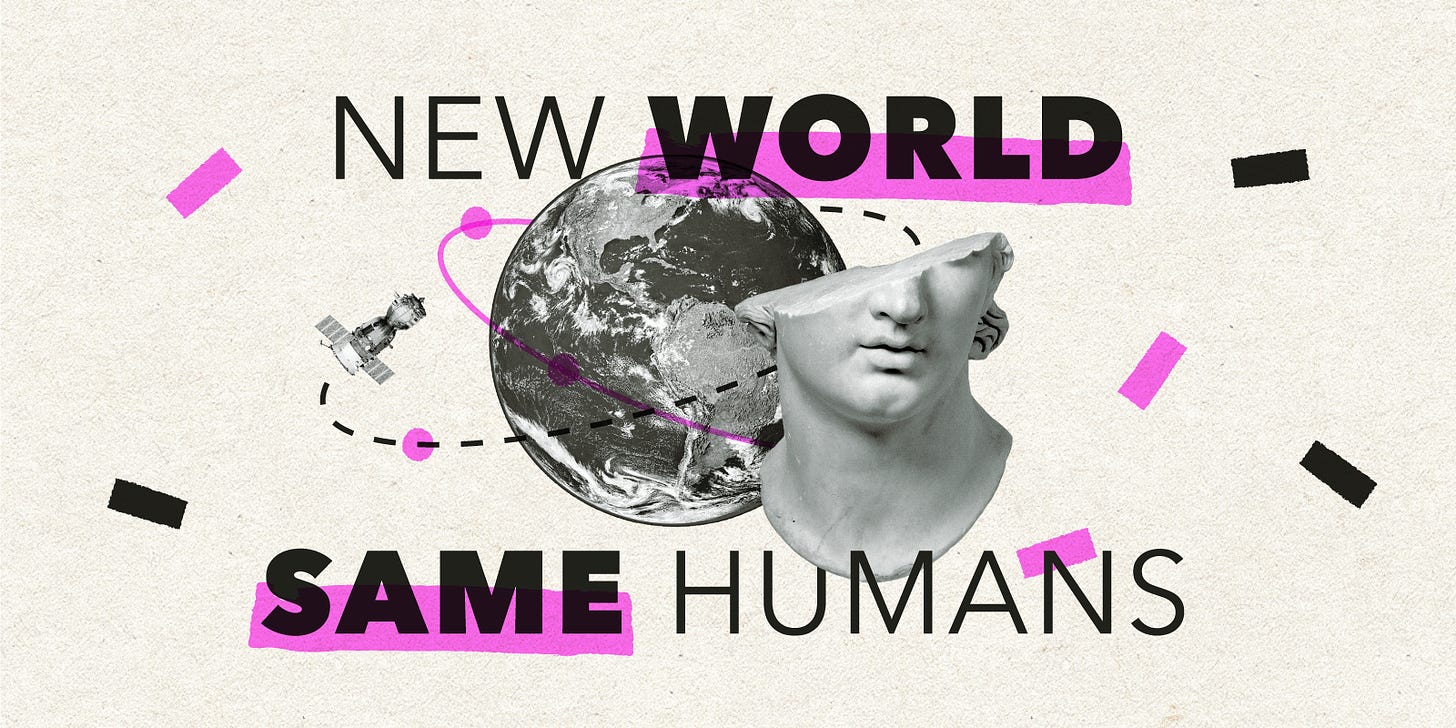Hoping for a Miracle
Is it time to embrace a dose of realism when it comes to the climate crisis?
Welcome to New World Same Humans, a weekly newsletter on trends, technology, and society by David Mattin.
If you’re reading this and you haven’t yet subscribed, join 19,000+ curious souls on a mission to build a better shared future 🚀🔮
🎧 If you’d prefer to listen to this week’s instalment, go here for the audio version of Hoping for a Miracle. 🎧
Human activity is causing deep, irreversible damage to the Earth. A mountain of good science tells us so.
But what is our knowledge of all this doing to the collective human psyche?
This week saw a new report on attitudes to climate change. The report celebrates the idea that most people still believe we can solve global warming. At first glance, that seems sensible enough. It’s great – and useful – that people still have hope, right?
I wonder if things are a bit more complicated. Sounds a strange thought? Read on.
How does the climate crisis make you feel?
The study of ‘climate despair’ – or what the Swedes call klimatångest – is relatively new. In 2015 the social scientist Renee Lertzman published a foundational text in the field, Environmental Melancholia. And David Wallace-Wells’s 2019 book The Uninhabitable Earth was widely held at the time to have prompted a wave of klimatångest among its readers.
Now, there’s a growing effort to interrogate global heating as a collective psychological crisis. I can’t help wondering, though, about one of the principal assumptions on which this effort is founded.
A prime example of that assumption came this week. Working with global market research firm Ipsos, creative agency Futerra Solutions Union published The Solutions Survey, a report that asks, ‘does the world still believe we can solve climate change?’
A full 19,520 adults were surveyed across 27 countries. Futerra says 17% of respondents were ‘strong optimists’, who believe that, ‘humanity is able to reduce climate change and we’re going to do so successfully’. Meanwhile, 41% were ‘soft optimists’, who believe we have the power to reduce climate change, but that it’s unclear whether we will act.
Two observations. First, while the report’s title talks about ‘solving’ climate change, it seems the respondents were asked about ‘reducing’ it.
Second, Futerra’s definition of ‘soft optimists’ stretches the word ‘optimism’ to near breaking point. The belief that we can reduce climate change, but I’m not sure we’ll get our act together and actually do it is not all that optimistic.
It’s feels as though the authors of this report want to stress a particular angle here. That is, the idea that optimism is still alive: ‘most people believe we can solve this thing!’ And that’s no surprise, given that Futerra bills itself a ‘change agency’ founded in the conviction that telling positive stories about our response to climate change can play a crucial role in bringing about the further action that’s needed.
I don’t want to appear unduly critical of Futerra. The report is a worthy and interesting piece of work, and there’s no doubting the agency’s sincerity.
I wonder, though, about the assumption that underlies the report; an assumption shared by almost everyone who works in the field. That is, that climate despair is to be discouraged, and hope is our best friend.
Futerra’s work has been timed to coincide with the ongoing COP26. And looking at its conclusions in the light of events at the summit leads us to some interesting places.
The messaging around COP26 has focused relentlessly on the 1.5C target set in Paris in 2015. But modelling in the wake of this week’s new emissions pledges shows that they put us on track only to keep warming under two degrees. Two degrees of warming means a substantially degraded environment, and a catastrophe for tens of millions of people who live in the world’s most vulnerable places. And remember, we’ll only get there if the pledges made this week are adhered to by every relevant national government, forever.
The reality is that the 1.5 C target is slipping out of reach. The IPCC admitted as much in a 2018 analysis.
Belief in end times, of various kinds, is nothing new. But no human society in history has ever had such a belief buttressed by so much empirical evidence. The question that Futerra and others interested in climate despair seek to answer is: what is the best collective psychological response to these unique circumstances?
Mainstream opinion says hope. And the logic that fuels this conclusion appears unimpeachable. To let go of hope is to admit defeat. If we admit defeat, that will invite inaction. We need to keep hope alive, or we’ll do nothing.
The thing is, there is no good evidence for that set of assumptions. They are widely believed because they make superficial sense: no one acts on a cause they already believe to be lost. But human behaviour, and especially human collective behaviour, is rarely sensical in that way. Reason can point one way; humans are still perfectly liable to go another.
That leads us to a radical idea. What if hope – at least of the kind commonly encouraged today – is not the best answer? What if we need, instead, to admit some form of defeat? What if that will help us work through the collective psychological and spiritual crisis caused by climate change, and to find new forms of action?
This feels a dangerous thought, so I want to be clear. I’m not saying we should admit defeat on climate change and then do nothing. I’m wondering aloud whether admitting a form of defeat could be, paradoxically, the spur that leads us both to new action, and to new ways to meet what lies ahead with resilience.
What would this look like? Much of this hinges on the crucial recognition that admitting some form of defeat doesn’t mean telling ourselves that all hope is lost, and so we may as well do nothing. That is black and white thinking, brought to bear on a situation that contains many shades of grey.
Instead, we could concede that the systems – technological, economic, and social – that fuel climate change are so entrenched that we cannot overturn them entirely. At least, not fast enough to meet the 1.5C target and avoid a significantly degraded Earth.
We could find ways to enact a period of collective grieving for what we’ve already lost and will lose in future: people, ways of life, natural environments, plants and animals. And allow that collective reckoning – a psychological and spiritual reassessment of the crisis that we’re living through – to lead us to an atonement in the form of new mindsets and collective behaviours. Including those that lend us the strength to take whatever action we can, and to support one another through what lies ahead.
It’s a strange idea, that admitting a form of defeat may lead us to renewed determination and new action. But we don’t have to choose between all is lost paralysis and false hope. Perhaps it’s only in a collective recasting of our psychological relationship to climate change that we find the strength to act. After all, so far we’ve failed even to articulate a plan that will limit heating to 1.5C. The optimism we’ve cultivated has not translated into action. Perhaps if we truly stare this crisis in the face, and admit the ways we’ve already failed, that can change.
Seen this way, what I’m suggesting isn’t really about defeat. It’s a call to be truthful about the kind of victory still available to us. If we inhabit that truth, could we find a new strength?
This is a subject fraught with complexity, and the ideas I outline here are more a kind of thought experiment than a set of firm conclusions. I’ll be writing more on all this soon.
In the meantime, I’m intrigued to hear what the NWSH community thinks about our prospects for managing climate change, and on the question of hope verses realism. If you’d like to have your say, then join us in the NWSH Slack group.
Strange Dreams
Thanks for reading this week.
In the 2020s, the climate crisis will produce strange new collective psychological and spiritual deformations. It’s yet another case of new world, same humans.
This newsletter will keep investigating. And there’s one thing you can do to help with that mission: share!
So if this week’s instalment resonated with you, why not take a second to forward this email to one person – a friend, family member or colleague – who’d also find it valuable? Or share New World Same Humans across one of your social networks, and let people know why it’s worth their time. Just hit the share button!
I’ll be back as usual on Wednesday; until then, be well.
David.





